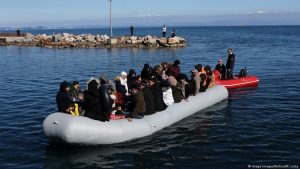Djiby Dieng packed just a tiny backpack when he boarded a brightly coloured wooden boat at the Senegalese port of Mbour to seek his fortune in Europe.
The 21-year-old left on October 18, without telling his mother, hoping to reach Spain’s Canary Islands — embarking on a perilous ocean journey of about 1,500 kilometres (about 930 miles) made by thousands in recent months.
He was lucky to escape with his life.
Also read: 40 miners trapped as gold mine shaft collapses in Zimbabwe
Fuel and water shortages, and a faulty engine, forced Dieng’s boat to beach in Morocco.
“There were people of all ages, young and old. Fifteen people were dehydrated,” he said.
According to the International Organization for Migration (IOM), some 18,000 people have landed on the Canaries this year — surging from just over 2,600 last year — in a huge movement of mostly West African migrants attempting to reach the archipelago and escape poverty.
But the crossing is treacherous.
Migrants often leave from Mbour, some 100 kilometres south of the capital Dakar, in crammed traditional fishing canoes, known as pirogues.
Over 500 people have died this year — most in October and November — according to the IOM, more than double last year’s figure. The official death toll is also thought to be conservative.
In one harrowing case in October that caused outrage in Senegal, a 15-year-old boy, aiming to enrol in a football training centre in Italy, fell ill and died during the crossing, and was thrown overboard.
“There’s nothing left here,” said Dieng, a fisherman, explaining why he decided to risk the ocean route.
Locals cite dwindling fish catches in the poor nation as one of the reasons behind migration, but economic difficulties linked to the Covid-19 crisis are also playing a role in forcing people to go overseas.
The sudden exodus has turned into a political problem too, highlighting questions over Senegalese government promises to create hundreds of thousands of jobs.
Senegal’s roughly 50,000 local fishermen have long complained that collapsing stocks and competition from foreign factory ships are ruining them.
Fishing is a traditional occupation in the country, which has a 700-kilometre-long Atlantic coastline, and which indirectly employs some 540,000 people, according to the United Nations.
It also accounts for 1.8 percent of the country’s GDP.
Mustafa Fall, an official at a local migration NGO, said that the current surge of people leaving from fishing communities was unprecedented.
The pandemic forced wharves to close for part of the week and the heaving seaside fish markets to shut early.
“People suddenly became impoverished,” Fall said. “There are departures every day, thousands of people in all.”
Fishermen can hope to earn between 100 and 200 euros ($120-$240) a month in Senegal, but often pay small fortunes to migrate.
Khalifa Samb, a 22-year-old fisherman, said his mother Bemy helped him pay the roughly 600-euro ($700-) fee to secure his place on the pirogue to the Canaries.
His attempt ended in failure after the boat’s engine encountered trouble, and food and drink began to run low.
“We decided to come ashore in Mauritania, otherwise we would have died,” he said.
Others are less lucky.
Saliou Diouf, a 22-year-old fisherman with a wrestler’s build, told AFP that he was en route to the Canaries with about 200 other people in October when the engines failed and jerry cans on board caught fire.
“There was panic,” he said, describing how he and other passengers leapt into the water to escape the flames.
“Some of them couldn’t swim and grabbed onto me. I told myself that I wouldn’t die if God hadn’t decided it,” he said.
The IOM said that more than 140 people died in that accident, although Senegal’s government disputes the figures.
Diouf told AFP that rescue boats pulled about 50 people from the water, suggesting, in line with IOM figures, that around 150 people drowned.
Fishermen such as Samb, Diouf or Dieng are often accomplished sailors, accustomed to the trials of long sea journeys.
But many others who risk the crossing, such as the women and children, cannot swim and are in greater peril when disaster strikes.
In response to the migration surge, Senegalese police and gendarmes have increased coastal patrols and intercepted more boats, as well as arresting smugglers.
But the government has also had to contend with fresh grievances over foreigners’ access to Senegalese waters.
On November 11, the European Parliament approved renewing a fishing deal allowing French, Spanish and Portuguese ships to fish in Senegalese waters, for example, causing anger.
The Senegalese government, defending the pact, points out that only 31 European vessels fish its waters and that the agreement has also seen millions invested in job programmes.
The government also argues that Covid-19 has battered the informal economy in many countries besides Senegal.
Three ministers were dispatched to Mbour last month to talk to residents about the situation, speaking in a hotel emptied by the pandemic.
Senegalese Youth Minister Nene Fatoumata Tall decried social pressure from families, forcing young people to take to the sea, and said they were being sold an “Eldorado” false dream.
The message appears to be falling on deaf ears, however.
Migrants who reach the Canaries send photos of the picturesque archipelago to friends and family at home, who often live in modest breeze-block bungalows.
Dieng, the would-be migrant who came ashore in Morocco, said he and his friends talk about leaving often.
Bemy Samb, fisherman Khalifa Samb’s 45-year-old mother, also said she supported her children migrating.
“There is enough food for lunch, but not in the evening. They sold the sea,” she said, alluding to fishing by foreign trawlers.
“I prefer that the children leave, they will find what they need over there.”
Her son, despite the risks, agreed: “If the opportunity arises again, I won’t hesitate”.





